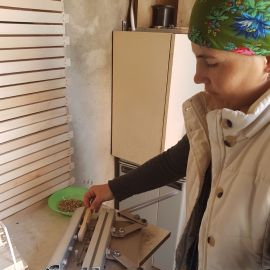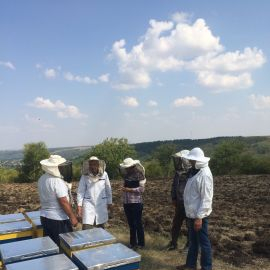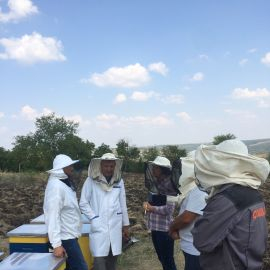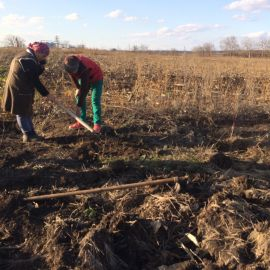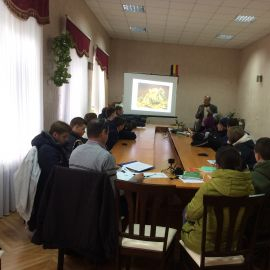back
Moldova responds to the Covid-19 crisis. 'Gift of Bees', the 'sweet' social business bringing change to Cimiseni
legenda companii en
Social entrepreneurship is developing in Moldova, mostly thanks to European grants. More jobs, designed for people with disabilities, their involvement in economic activities, easier access to social resources and services...
Social entrepreneurship is developing in the Republic of Moldova, mostly thanks to European grants. More jobs, designed for people with disabilities, their involvement in economic activities, easier access to social resources and services... An eloquent example of this is the social and agricultural enterprise "Darul Albinelor" in the village of Cimiseni, Criuleni district. The bee hive - 50 families in total - was created by the Association of Deaf Children of Moldova (ACSM), through the project "Beekeeping - an opportunity for occupational integration, entrepreneurial training and professional orientation of young people with disabilities". The initiative is funded by the European Union and co-financed by Sweden through the East Europe Foundation. "Green therapy" transforming the rural environment Social entrepreneurship is a relatively new concept in the Republic of Moldova and involves the practice of agriculture, plant cultivation and animal husbandry for social purposes, aimed at socially disadvantaged people with physical, mental or emotional disabilities. It is a kind of "green therapy" that could transform the rural environment into a friendly and beneficial one for these people. In practical terms, it involves developing a farm that allows people with special needs to be involved in the daily life of the household, with traditional activities combined with modern farming technologies. In recent years, the European Union has invested in various social entrepreneurship projects in Moldova. One of the successful initiatives in this field is the "Gift of Bees" beehive in Cimiseni, Criuleni. Ms Veronica Căpătici, executive director of the Association of Deaf Children of Moldova, the organisation implementing the project, says that the area is rich in honey-producing nectar-producing flora, with a high beekeeping value and a great appeal to bees. The idea of a beekeeping business came to the members of the association after several discussions with people in the village, where more than 100 disabled people live. Together, they presented the initiative to the mayor and asked him for a hectare of land for the meadow, as well as for growing honey plants and planting some lime saplings. After the members of the Association told the local councillors about the benefits of social farming for rural areas in general and for Cimiseni in particular, the initiative was unanimously approved by the local council. Shortly afterwards, a cooperation agreement was signed with Cimiseni Town Hall, which offered a hectare of land for the next 15 years free of charge for the location of beehives. The solution came from the European Union The big challenge remained: the money to be invested in the hives, the bee families and the honey extraction equipment, as well as the salaries of the future employees. "The solution came from the European Union," says Veronica Căpătici. But before that, in 2018, members of the Association wrote a thorough project arguing the need for social entrepreneurship in a community with many people with disabilities. They got the funding, and in early 2019 they started the project. The work to set up the prison was done first, and from the outset, local people with disabilities were involved. The business was named, by mutual agreement, "The Gift of the Bees". Shortly afterwards, also as part of the project, a modular building with machinery and equipment for the collection and processing of bee products was purchased and installed on the premises. In fact, in the first two months of 2019, all the purchases were made and the training workshops for future employees, specific to the beekeeping sector, were set up. "Our young people have been trained, they benefit from practical and theoretical classes in beekeeping. In the future, when they have mastered beekeeping, we want to help them set up their own business. At the moment, three people are employed at the farm, and they love working with bees...", says Veronica Căpătici. The first "fruit" of honey, in the spring of 2019, was modest, and experts advised them not to sell it, but to let it be fed to the bees: the aim of the Association was to produce eco-honey, and for this the bees' feed must also be organic. This "eco", by the way, is another reason that made Veronica Căpătici opt for the "sweet" idea of entrepreneurship - more precisely, the desire to contribute to the perpetuation of the bee species on the planet, as they are crucial for maintaining ecological balance and biodiversity in nature. She had been studying the impact of the dramatic decline in bee populations both globally and locally, and through the social work of the Bee Gift enterprise, members of the association also aimed to support the global movement in support of bee conservation. "Social inclusion and job creation for people with special needs in rural areas is a real challenge. Most of them work as day labourers and have meagre incomes. Veronica Căpătici has set herself the goal of not only employing them in the beehive run by the Association, but also training them in farming skills that they can practice elsewhere. "We want the activities of our beekeeping farm to support people with disabilities both in Cimiseni and in other localities, to help de facto their social inclusion, and ultimately to contribute to the improvement of the quality of life both in our community and in the region," she says. The life stories of the project's beneficiaries convince us that such initiatives are vital for communities and especially for people. Ecaterina Marușceac was born and raised in Cimiseni. Although she has a severe degree of disability, she managed to go to university at the State University of Moldova, but it didn't help her earn a living. Efforts to get a job were futile for several years. To support her three children, one of whom is a pupil and two of whom go to kindergarten, Ecaterina works as a day labourer. But money was barely enough for food... Now she works at the "Gift of the Bees". "I have a stable job. I learned how to work with bees, how to extract honey. I feel respected, I like to be heard, listened to, I feel that we are all masters here, at the hive", Ecaterina Marușceac told us confidently. Another employee, Cristina Oleinic, has a similar story. A mother of two, she had never had a stable job - she thinks her severe disability is to blame. Cristina never left the village and worked as a day labourer, but her health didn't allow her to earn much money and she never knew what she could put on her children's table. "I was happy when the prisaka appeared. Now I go to work every day. I know exactly how much income I will have and I can plan exactly how much to spend. I'm glad I can work at home with my children so I can raise them, with my parents so I can help them in their old age," she says. "The quarantine hasn't thwarted our plans, on the contrary, we've come up with new ideas" The year 2020 has started very promisingly at The Gift of Bees. All the bee families have made it through the winter, in spring the first work was done in the hives. Also, on the land offered by the town hall, 40 linden trees were planted and a plot with "Malifera Facelia", a plant to which more and more beekeepers from Moldova are turning, which provides a high honey production. The members of the Association are convinced that beekeepers who want to form their own honey base in the vicinity of the meadow should cultivate facelia. They were saddened by the introduction of quarantine, but as this coincided with the period when fewer workers were able to work, it was not an impediment to the hive work process. They quickly adapted to the quarantine conditions, took protective measures and, like the 50 families of bees, are still working. What's more, in this "unusual" spring for all of us, the employees of the "Gift of Bees" have also decided to do some outreach and enlightenment work. They tell the people of Cimiseni that bees pollinate most of the fruit, including nuts and vegetables that people eat. Without bees, flora, fauna and even humans as a species will be threatened with extinction. She shares all this information on social media to keep the community well informed. Also during this period, the members of the Association have put on paper a new development plan, which aims to attract new funds for the installation of a honey packaging line and the purchase of machinery to produce wax goods. They are also planning to develop a methodical guide to beekeeping, adapted to the needs of people with disabilities, and to promote the social purpose of the business and the resulting bee products, they want to participate in exhibitions and fairs. Profits from the business will be used to pay the employees' salaries, to develop the business and for other services for people with disabilities, as the work must continue after the project is finished - otherwise what would be the point of all this effort? "We want the idea started here in Cimiseni to develop and contribute to increasing social inclusion throughout the country, creating jobs for people with special needs and involving them in economic activities. In fact, we want to shift the focus from social assistance to the promotion of social inclusion practices, thus transforming disadvantaged people from consumers of resources into generators of value. We are convinced that we will continue to be helped and supported, because we have good ideas, we know how to implement them and we help people", says Veronica Căpătici. This article is published as part of the EU project "Strategic Communication and Media Support", in the context of the information campaign on the EU's global response to the COVID-19 crisis. The content of the material belongs to the authors and does not necessarily represent the views of the EU. Violeta Ciobanu

